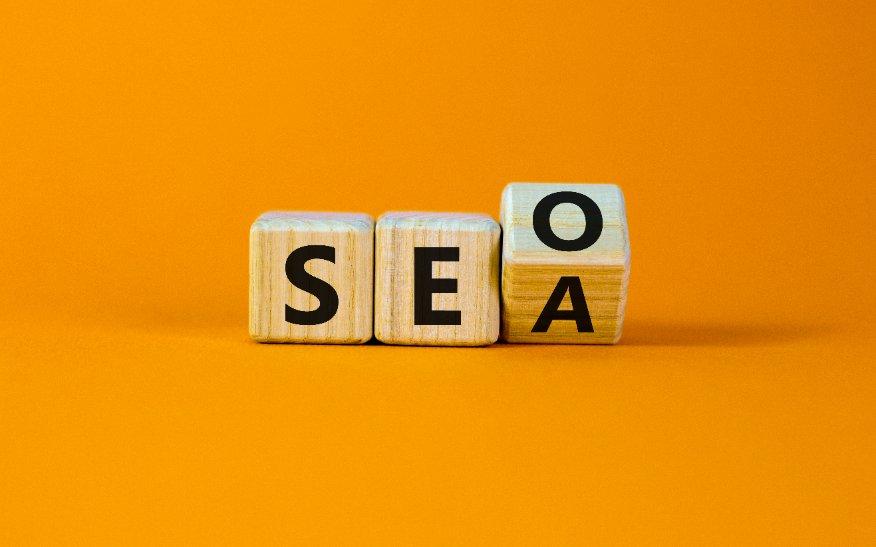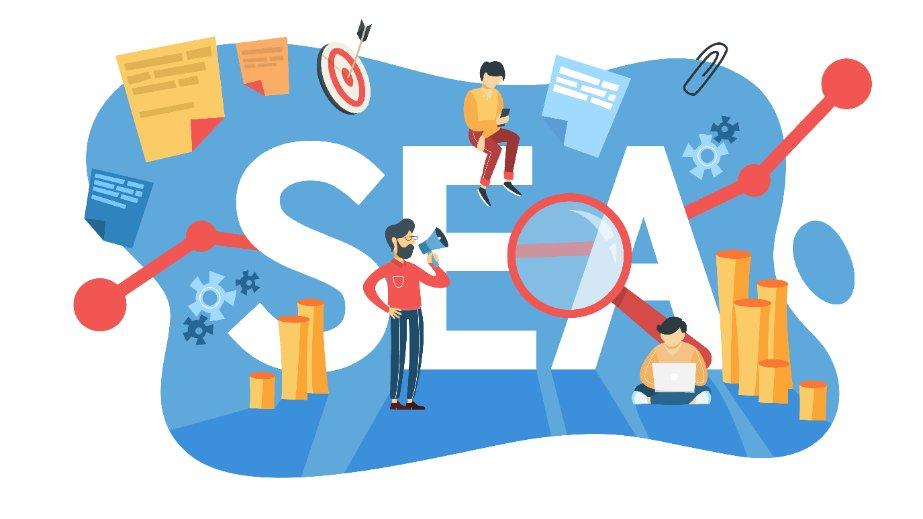SEO vs. SEA - The great comparison
- SEO is the optimization of a website so that it ranks as high as possible in the organic search results.
- SEA refers to all activities related to paid placements in the SERPs.
- Unlike SEO, SEA is a form of online marketing where you buy clicks on an ad instead of getting them organically.
- SEO is a long-term and sustainable strategy.
- With SEA you achieve faster success, but this requires more budget in the long run.
- SEO and SEA can complement each other very well. Both are important for a holistic online marketing strategy.
In this article we cover the following topics:
Are you looking for an SEO partner to set up, revise or supplement your search engine marketing strategy? With us you are in the right place. Our agency stands for sustainable, individual and transparent search engine optimization. Together we can take your company or project to the next level. Feel free to contact us by email, phone or WhatsApp.

SEO vs SEA - the differences between organic and paid search
If you want to be found online, online marketing is the key. Especially Search Engine Marketing (SEM) is becoming more and more essential in order to prevail against the competition. SEM consists of Search Engine Optimization (SEO) and Search Engine Advertising (SEA). But what exactly is SEO? And what is the difference between SEO and SEA?
Search engine optimization is the process of optimizing a website for the organic results pages of the Google search engine. The goal of SEO is to be ranked in the organic Google search results for specific keywords. SEA, on the other hand, stands for Search Engine Advertising. SEA is the purchase of ads on Google's search results pages. The goal of SEA is to get your ad seen by as many people as possible.
So what's better? Well, that depends on your goals. If you want to increase brand awareness or drive more traffic to your website, SEA might be the better option. The results of SEO may not be as quickly visible as those of SEA, but search engine optimization is often the cheaper and more sustainable alternative.
In this article you will learn what the specific advantages and disadvantages of the two types of search engine marketing are. Have fun reading.
What is the difference between SEO and SEA?
What is SEO (search engine optimization)?

SEO is the optimization of a website so that it appears in the organic search engine results pages (SERPs). The higher the position, the more visitors will click on the search result to your website. Google is currently the most used search engine in Germany, with a market share of 83% in desktop search and around 97% in mobile search (1). For this reason, it makes sense to optimize your website primarily for Google. But also consider which other search engines are relevant for your target group. There are also many small and regional search engines in Germany, which are certainly of interest to you and your company.
The basis for a good ranking is, on the one hand, good content that answers the searcher's question as accurately as possible. On the other hand, Google also considers technical factors such as the speed of the page when evaluating the ranking. In addition, Google attaches great importance to user-friendliness: if a website is difficult to use or does not function properly on mobile devices, this will influence the ranking.
SEO is a long-term and sustainable project: You can't just create a new website and then wait for the rankings to improve. Regular updates to the content and technical infrastructure of the website are necessary to maintain and improve rankings in the long term. Depending on the competitive situation and the keywords you want to rank for, it can take several months or even years to achieve a good position in Google's organic SERPs. However, the results are sustainable, because SEO measures show their effect over time. Although the SEO work is already done, the rankings last longer and continue to provide more visibility.
What is SEA (Search Engine Advertising)?

SEA stands for Search Engine Advertising and refers to all activities that have to do with paid placements in the SERPs. So unlike SEO, SEA is a paid form of online marketing where you buy clicks on your ads instead of getting them organically through good placements.
The best known form of SEA is Google Ads, formerly known as Google AdWords. With Google Ads, you can place ads on Google's search results pages that are specifically marked as advertising with an "Ad" label.
The big advantage of SEA is that it delivers results faster than SEO: Once you've created your ads and set up your campaign correctly, your ads will appear in the SERPs almost immediately. Of course, this also means that SEA is more expensive than SEO in the long run, since you have to pay for every single click on your ad. The price per click (CPC) depends heavily on how much competition there is for a particular keyword: If many companies bid on the same keyword, the CPCs are higher than if there are only a few bidders.
SEO - Pro & Con
What are the advantages of SEO?
-
Sustainability & longevity: SEO is a long-term process with sustainable success. Once a website is optimised for search engines, it does not need to be constantly tied to an advertising budget, as is the case with SEA. For these reasons, SEO should be an integral part of any digital marketing strategy.
-
Search engine marketing basis: SEO forms the basis for further measures such as SEA or social media ads. Because a well-optimised website converts potential customers who have been acquired through advertisements to a greater extent.
-
Relevance for users: The optimisation efforts primarily benefit users by delivering relevant and highly accessible results. This is in line with Google's mission to "organise the world's information and make it universally accessible and useful".
-
Costs: Please note that you also have to invest time and money in SEO and that success is usually delayed. However, in the long term, SEO is usually the more cost-effective measure, because SEO traffic is always free.
-
Relevance of organic results: According to an analysis by Sistrix, only 6.8% of all Google clicks actually go to ads. Users therefore prefer organic search results. (2)
What are the disadvantages of SEO?
SEO takes time: SEO is not a one-time process - it requires continuous efforts to achieve good results. Moreover, it can take several months before results become visible.
Complex, especially when there is a lot of competition: SEO is time-consuming and requires perseverance to achieve results. Especially when you are up against strong competition. However, for companies willing to invest time and effort, SEO can be a valuable tool to increase visibility. There are many helpful tools on the market that support the SEO process extensively.
Constant re-optimisation: SEO is not done with a one-off optimisation. You always have to stay up-to-date and follow the Google updates. In addition, you should not "fall asleep" on your own website, but regularly publish new important topics and carry out optimisations.
SEA -Pro & Con
What are the advantages of SEA?
Top placement: Search engines such as Google or Bing naturally want to earn money, which they do primarily through ads. The search engines therefore have a great interest in the ads being clicked on. That is why they are listed at the top of the search engine results and marked with an ad.
Rapid traffic increase: If you decide to place ads, they will be displayed within a very short time. This way you can reach your potential customers directly and quickly, without waiting long for the indexation and rankings of your websites.
Targeting & regionality: The ads are displayed based on the keywords that you have previously defined. This means that the probability is very high that you will reach the target group you want to reach, as they search for exactly the terms you have saved. In addition, with SEA you can advertise precisely in your target region.
Measurability & Control: You can calculate in advance exactly how much budget your SEA campaign will take up. This makes it easy to calculate the costs for SEA. In addition, you have full control during your campaign and can adjust it at any time.
Ergänzung zur organischen Optimierung: Darüber hinaus kann SEA eine Ergänzung von SEO zu bestimmten Keywords sein, die noch nicht die gewünschte Position in den SERPS erreicht haben.
What are the disadvantages of SEA?
Traffic depends on budget: If you stop or pause your campaign, no more traffic will be generated via the ads. This means that you have to constantly "feed" Google with budget.
Dependence on Google: The more competition there is for a certain keyword, the more expensive the CPCs become. Since Google is currently the most popular search engine in Germany, you are also dependent on it to bring traffic to your site, just like your competition.
Google Ads alone do not guarantee clicks: To get clicks and conversions with the help of ads, your SEA campaign must be optimised carefully. In addition, the landing page must match the ad so as not to raise false expectations among users.
SEO or SEA: When is which channel better?

When does SEO pay off?
If you have time and want to invest in a long-term and sustainable strategy, SEO is definitely the right approach for you. In general, search engine optimisation is a good basis for all other marketing measures, as it offers high relevance for people who are interested in your product or service. With the help of targeted content, you not only increase your page authority, but also gain the trust of your customers or potential customers.
When does SEA pay off?
SEA is worthwhile if you want to achieve short-term, quick results. SEA is also helpful if you use it in addition to SEO to get attention for a specific keyword. SEA can also be used for brand-building measures. This is a good idea especially for companies that have not been on the market for very long. Because with a placement at the top of the SERPs, brand perception and brand awareness are increased, even if users do not necessarily click on the ad. Another example of using SEA is for time-limited events. For example, if you are planning a webinar and want to promote it, it makes sense to place ads in advance to draw viewers' attention to you. Or if you have a seasonal offer, such as a summer collection or a Christmas voucher.
Why do you need a SEO strategy?
Every company that wants to be successful needs a solid SEO strategy. If companies take the time to understand how the Google algorithm works and what users are searching for, they can ensure that their website appears as high up in the search results as possible. And since most users never go beyond the first page of results, it is important to rank as high as possible.
Eine SEO-Strategie kann den Usern auch helfen, die relevantesten Ergebnisse zu finden, wenn sie nach einem bestimmten Begriff suchen. Indem Du Deine Website für die richtigen Suchbegriffe optimierst, kannst Du sicherstellen, dass Du eher qualifizierte Leads anziehen wirst, die mit größerer Wahrscheinlichkeit in Kunden umgewandelt werden.
In a nutshell: An SEO strategy is essential for any business that wants to be visible online and attract new customers.
Why do you need an SEA strategy?
A well-implemented SEA strategy can help increase website traffic, leads and sales. With the help of SEA, your business site is easier to find for customers. Given the importance of online search, an effective SEA strategy is important for any business that wants to succeed in the digital age.
There are many factors to consider when developing an effective SEA strategy, but among the most important are keyword research, ad copy writing and price per click (CPC) :
Keyword research helps you identify the words and terms your target audience is searching for. Once you have identified relevant keywords, you can use them to improve the visibility of your website in the paid SERPs.
Ad copy writing is about creating compelling ads that contain relevant keywords and phrases.
The CPC is crucial for a good SEA campaign. It makes sense to use keywords that have the highest possible search volume and cost as little as possible per click. This way you can better control your budget.
An effective SEA strategy can be complex, but the potential benefits are obvious. Used correctly, SEA can be a powerful tool to increase traffic and sales. However, businesses need to ensure they take the necessary steps to create a successful campaign.
Fazit: SEO vs. SEA – beide haben ihre Stärken & Schwächen
Digital marketing is a complex and constantly evolving field and there are a variety of different channels that businesses can use to reach their target audiences. One of the most important and popular is search engine marketing, which includes SEO (search engine optimisation) and SEA (search engine advertising). Both have their own advantages and disadvantages, which means that the best approach for a particular business depends on individual goals and budget constraints.
SEO is a long-term strategy that can take months or even years to achieve results, but it is also relatively inexpensive and offers a high ROI once it pays off.
SEA, on the other hand, is a much quicker way to get results, but can also be quite expensive if not done carefully. So which approach is best for a particular business depends on a variety of factors, and it is important to consider them all before making a decision.
Ultimately, a comprehensive digital marketing strategy should always include both measures - ideally in combination with other online marketing strategies based on social media marketing or email marketing, for example. By using different channels together, you can reach potential customers in all phases of the customer journey - from the first perception to the purchase decision. This way, you not only increase the perception of your brand, but also significantly increase your chances of success online.
Image sources:
- dmitrydemidovich/123rf.com
- garagestock/123rf.com
- artinspiring/123rf.com
- dogfella/123rf.com
Sources:
- https://de.statista.com/statistik/daten/studie/222849/umfrage/marktanteile-der-suchmaschinen-weltweit/#:~:text=Suchmaschinen%2DMarkt%20in%20Deutschland,Prozent%20bei%20der%20mobilen%20Suche
- https://www.sistrix.de/frag-sistrix/seo-grundlagen/google/google-ads
About the author: Louisa Anger

Louisa specialises in writing search engine optimised texts and articles in the online marketing field. She researches and writes SEO-optimised content for various companies from different industries. At SEO-Suchhund, Louisa is the person responsible for the topic of SEO content.
